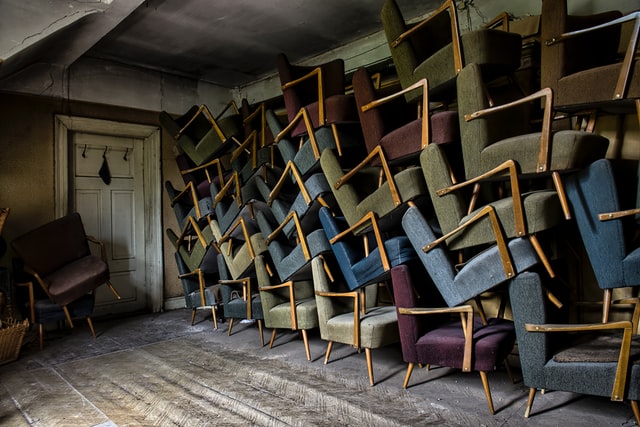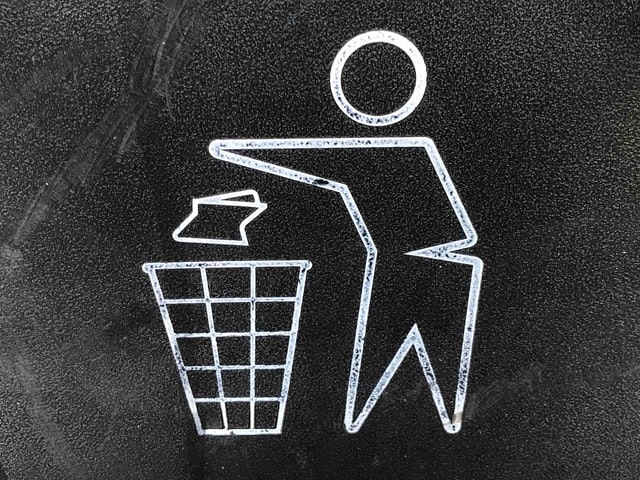When you have a check-out report done at the end of a tenancy, it should be compared with the inventory done at the start of the tenancy, and it is going to highlight anything that is in the property that wasn’t there before; in other words, it’s going to highlight things tenants leave behind.
From large pieces of furniture to bags of rubbish to lost socks in the dryer, anything and everything that is in the property has to be catalogued.
Yet if there are things tenants leave behind (and it happens in around 52 percent of properties), what is a landlord supposed to do about them? It’s an annoyance at the very least, and if the landlord is searching for new tenants, it becomes even more of a problem. Those things tenants leave behind just shouldn’t be there, but since they don’t belong to the landlord, can they remove them? Dispose of them? Sell them? Read on to find out more.
 Photo by v2osk on Unsplash
Photo by v2osk on Unsplash
Steps To Take With The Things Tenants Leave Behind
The very first thing to do – the first thing that you should do in any kind of dispute or area of concern, in fact – is to check the tenancy agreement. Ideally you will have a clause within that document that tells you exactly what you can and can’t do with the possessions and rubbish that have been left behind by tenants.
Remember; these clauses will need to be fair and they will need to be in line with the law. If you yourself have added a clause like this (or any clause) to the tenancy agreement, it’s best to get it checked over by a professional to ensure that you’re not going to have problems if you try to enact it.
What If There Is No Clause?
Not all rental agreements are going to include a clause about what to do with the things tenants leave behind – check yours now; if it doesn’t, it’s wise to add one, just to be on the safe side. Plus it will serve as a reminder for your tenants that they aren’t meant to be leaving anything of their behind when they do move out.
The main clause in a tenancy agreement will state that the property needs to be left in the same condition (or better) as it was when the tenant moved in. This is an easy clause to understand if the tenant has taken something away; a claim can be made on the deposit. But if they have added something, it’s much more difficult to work out.
In essence, the landlord becomes the ‘involuntary bailer’ for the things tenants leave behind, and it is their job to take care of those items. This is the law in the UK, but it’s a huge pain for any landlord, and they’re not going to want the hassle of dealing with it. Yet, without a clause written into the agreement, that’s exactly what they’ll have to do.
 Photo by DocuSign on Unsplash
Photo by DocuSign on Unsplash
How To Act As An Involuntary Bailer
The landlord is going to want to deal with the issue of the things tenants leave behind as soon as possible once they have become the involuntary bailer. Here are the steps to take
Contact The Tenant
The first thing you will need to do about the things tenants leave behind is to contact the owner of those things. Find out what they want you to do with them. If they say you should dispose of them, get this request in writing, and ensure they know you’ll be charging them for the cost of that disposal – it can be taken from the deposit.
If the tenant chooses to come and take the items, you must let them. However, it’s a good idea to accompany them into the property.
Protect From Damage
Until such time as the tenant or their representative can collect the items, it is the landlord’s duty to protect them from damage. They might be things tenants leave behind, but you still need to ensure they are kept safe (even if they are going to be disposed of).
Take photographs of everything; this is your proof that all was well when you found the items. Also make a detailed list of everything that was left.
This can be an arduous task, and it’s what a check-out inventory is for, so even if you hadn’t considered needing one before, it would save you a lot of time and hassle to get one done now.
How Long Do You Have To Take Care Of Things Tenants Leave Behind?
This is a great question. The law says that you need to take care of things tenants leave behind for ‘a reasonable time’, but that is so vague as to be useless. In most cases, 21 days is a sensible time frame – that should give the tenant enough time to either let you know they want you to get rid of it all, or to come and get the stuff themselves.
After this ‘reasonable time’, the landlord can dispose of the items without permission. They can also sell them if they want to, but any funds that come from a sale like this will technically – legally, in fact – belong to the tenant for up to six years after the sale.
If you are intending to dispose or sell the things tenants leave behind because you haven’t had a response from your efforts at contact, you need to give written notice to the tenant telling them exactly what you intend to do. You are legally obliged to return the deposit within 30 days from the move out date. Giving a notice of 21 days for the collection of the items gives you up to a week to claim your loses if you move fast.
Legally the document to refer to is the Torts (Interference with Goods) Act 1977. The notice must contain the following:
1. Date of the notice
2. The Bailor’s (tenants) name and other details if you have any
3. The Bailee’s (landlords) name and address
4. Your intention to dispose or sell the items if the tenant fails to collect them within the notice period
5. The list and reasonable level of description of the items in question
6. Instruction about how they can collect the belongings
7. If you intend to sell, you must include the date and place of the sale. Also include that if items are sold cost for storage and selling fees will be deducted.
8. Specify the amount, if any, which is payable by the bailor to the bailee in respect of the goods, and which became due before the giving of the notice.
 Photo by Gary Chan on Unsplash
Photo by Gary Chan on Unsplash
What Else?
These are the first steps to take once you have had a check-out inventory and discovered that there are things tenants leave behind in your property. Part two will be out soon which will have some more specific examples of what else you might be able to do.
In the meantime, if you need any advice or assistance, please don’t hesitate to contact Looksy Inventories.